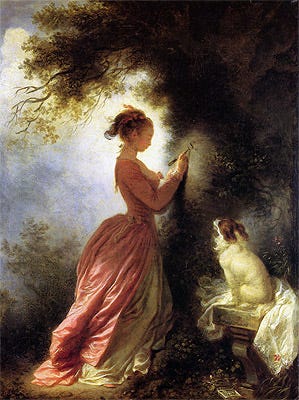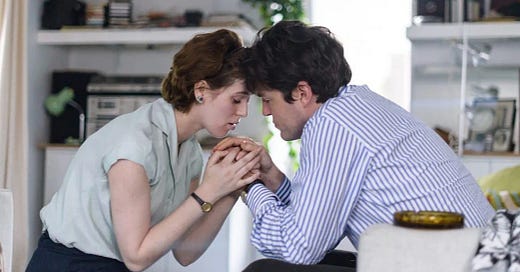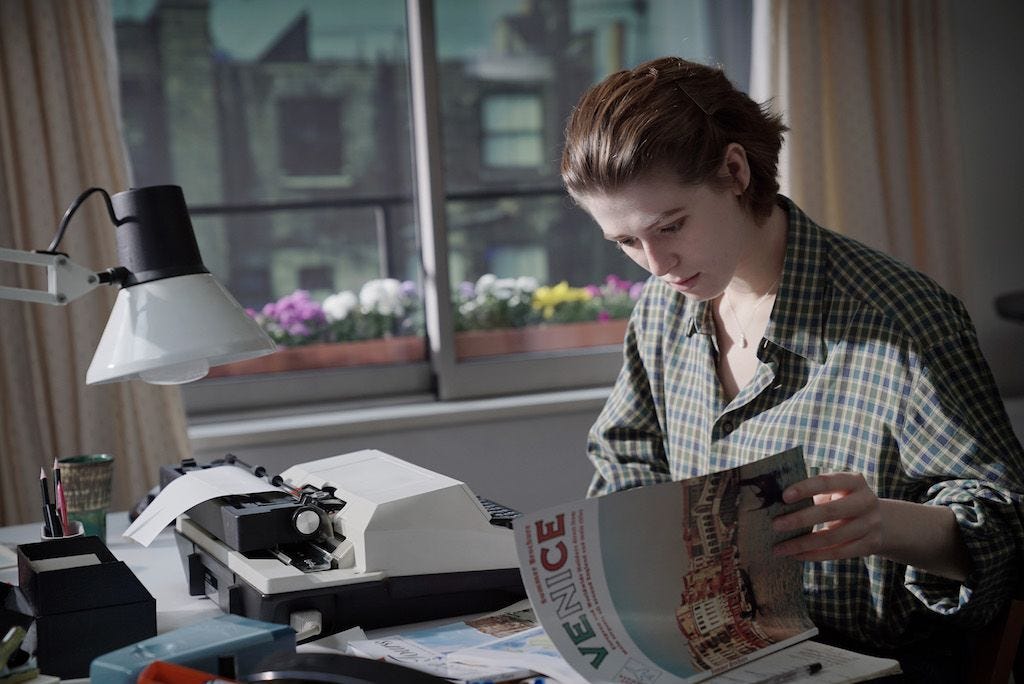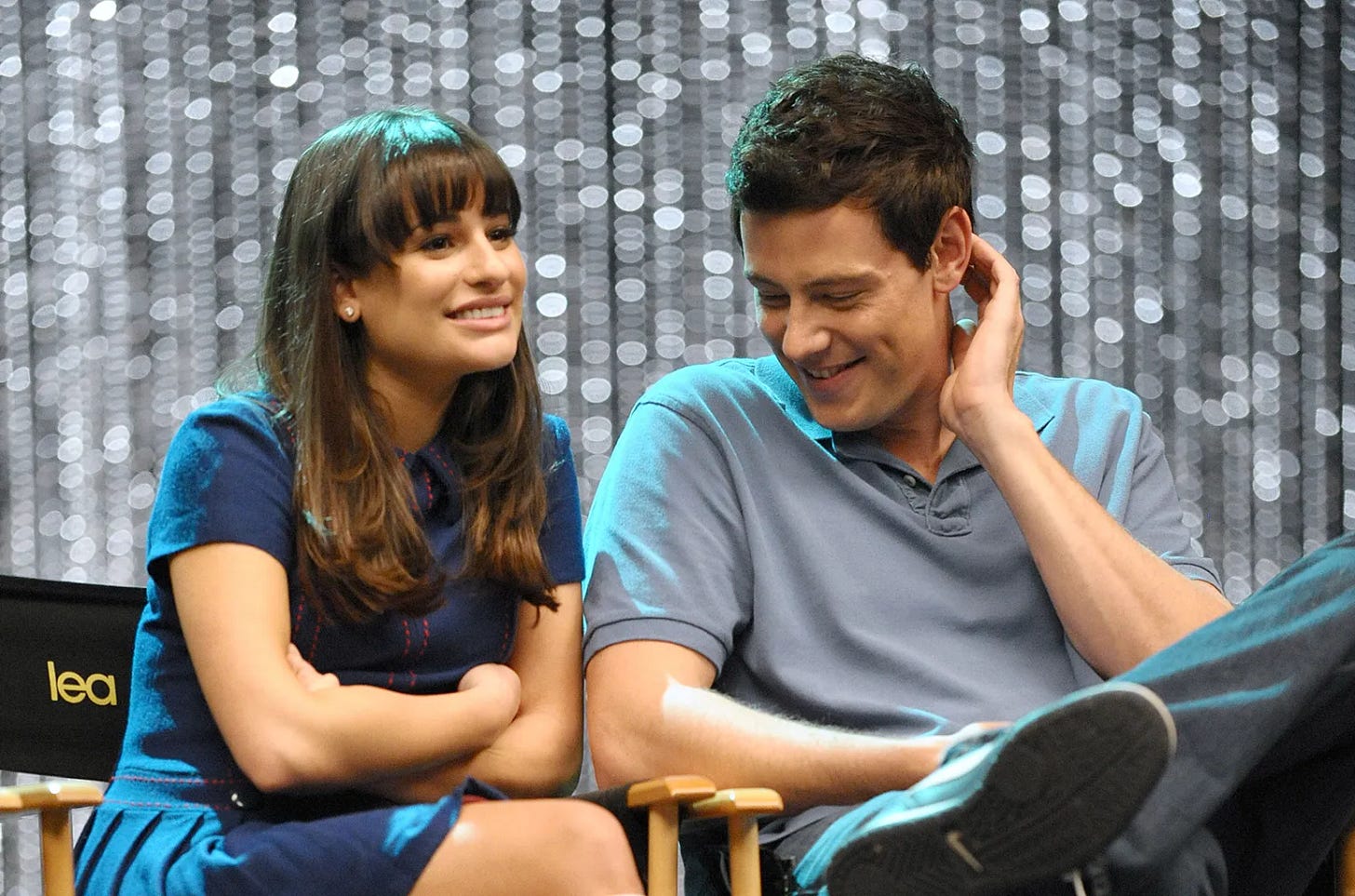Heroin(e) Romance Sours in "The Souvenir" (2019)
Filmmaker Joanna Hoag's revelatory romance is a thing of beauty.
Approximately forty minutes into Joanna Hogg's 2019 semi-autobiographical film, The Souvenir [trailer] a poignant exploration of a romantic relationship spanning six months, the story’s dynamic undergoes a seismic shift. A couple, Anthony and Julie, still basking in the honeymoon phase of their romance, finds themselves sharing a seemingly innocuous dinner with another couple, played by real-life spouses, Richard Ayoade (Patrick) and Lydia Fox (Lydia). What begins as an intimate portrayal of the intoxicating early stages of a relationship is abruptly upended when Anthony leaves the room and Julie remains.
Patrick: I’m trying to work out where you two tessellate here. I’m not good with euphemism, so…
Julie: Sorry, I don’t understand. (in the most amazing British upper-crust accent)
Patrick: Okay, so habitual heroin user, trainee Rotarian. Which is a good look. I mean it nicely.
How? What? Why? When?
Julie: Sorry I don’t -
Patrick: You don’t even dabble? Ok. I mean I don’t. I think it’s very mainstream behavior.
This reveal shocks the 25-year-old film student in the same way it floors the viewer, even those, like me, who know the film’s premise. Byrne's performance is a masterclass in raw emotion, her face a canvas upon which disbelief, confusion, and a sense of profound betrayal are painted through a kaleidoscope of pained expressions across a minutes-long dialogue. For a first-time actress this is a feat, let alone someone who is finding out about this twist, as she’s going through the scene.
The move, as it turns out was intentional. Director Joanna Hogg strategically withheld key information from the actress Honor Swinton Byrne, choosing not to disclose certain plot details prior to filming the pivotal scene. This was aimed to elicit a rawer, more authentic performance by allowing Byrne to experience and react to the revelations organically in the moment, enhancing the emotional resonance captured on camera. And it works.
Honor Swinton Byrne's performance in the film is a testament to her impressive acting pedigree. As the daughter of the renowned actress Tilda Swinton, who also portrays her on-screen mother, and the late Scottish playwright John Byrne, she inherited a rich artistic legacy. This lineage manifests itself in her ability to inhabit the role of Julie with captivating ease and depth. She also exudes strong Molly Ringwald-esque qualities in her demeanor and looks (red hair, pale skin), but this could also be a relic of this film’s setting in the 80s and the fashion of a young adult.
A Painting of a Girl as Aperitif
The bond between Julie and Anthony is primarily an intellectual one, a meeting of minds that forms the foundation of their relationship from the outset and arguably persists throughout the film's narrative, even as Anthony's struggles with addiction intensify. They share a passion for cinema and interpreting art, discussing it at length and arguing about it. Their chemistry beyond the initial platonic pull is hard to feel or envision. Yet despite their intellectual kinship and shared artistic sensibilities, a pervasive sense of uncertainty looms over Anthony's ability to reciprocate the depth of emotion that Julie eventually feels for him.
In other words: There is zero doubt by the midpoint that Julie is head over heels in a very British way for Anthony. There remains much doubt as to Anthony’s capacity to love her back, however.
Anthony’s major act of wooing Julie involves leaving behind a postcard of the painting, “The Souvenir” under the door to her flat. This is a calling card, of sorts, and its invitation comes with a solicitation to meet him at the Wallace Collection for a date. Once there, coming face-to-face with the painting from the postcard, Julie remarks that the girl in the painting, coincidentally named Julie and based on Rousseau’s heroine, looks “sad.” Anthony describes her as “determined” and “very much in love.” This prophetic interaction foreshadows the ending of the film when the relationship has finally run its course.

“Le Souvenir” or Memory
Before dating Anthony, Julie is confident, social, and curious, exhibiting a youthful loquaciousness and certainty about her film idea - a story about a working-class boy from Sunderland and his relationship with his mother. This unfinished concept is presented as a storyboard interspersed, throughout the film, in black and white.
After spending time with Anthony, Julie’s confidence and commitment to her craft wanes. Anthony’s sense of superiority and hurting Julie with intentionally wounding words, “You’re fragile,” serve to undermine her self-reliance and undercut her ambitions. He knows the effect it will have on her. After a while, she stops going to film school and spends her time worrying about Anthony as he gaslights her at every turn. Even after he steals from her and brings danger to her doorstep and inside her home, she’s the one begging him for forgiveness and longing for a return to his healthier days.
The Tilda Swinton of It All
Tilda Swinton is a driving force of good in this film, playing a rather minor role, as the mother to Julie. Her versatility in playing a lively matriarchal character like this alongside her daughter vs. a ruthless assassin in The Killer [Review here] demonstrates how much of a chameleonic talent she is. She also happens to be a frequent collaborator and star in Hogg’s works. In addition to this film, The Souvenir has a Part II and there’s The Eternal Daughter [Trailer] which looks much more like a horror film and quite a departure from this role.
Hiding Addiction in Relationships
In an interview with KCRW, Hogg notes that in the early 80s when she was in the relationship, there wasn’t much out there about heroin addiction. She couldn’t look it up on Google to check out the warning signs. As such, she was operating from a place of worry and a knowledge deficit.
One of the lasting impressions of this film is how well Anthony conceals his addiction from Julie until he can’t. More haunting, however, is Julie's complete and utterly believable obliviousness. At 25, I wouldn’t have seen track marks on an arm or injection sites for what they were. By the time Julie hears about what it is and is later complicit in driving Anthony to a heroin den, she has no concept of what it all means. She knows it’s bad but she’s too far in.
I’ve thought about such a likelihood and how it plays out in real life - the particular pairing of clean, sober actresses and Heroin addicted romantic partners. Apart from the Trainspotting recall of unhygienic, unsafe practices that can harm a partner, I recall many years ago hearing about the main actress from Glee, Lea Michele, and her fiance and costar, Cory Monteith, who died of a Heroin overdose and thinking how awful this was, first off, but also wondering how such a relationship can work at all. Isn’t he always off, trying to score, and completely unreliable? Isn’t she always trying to help him, cover for him, and yet helpless? Doesn’t she grow weary of this after a while? What’s the viability of such a dynamic? The same goes for the River Phoenix - Samantha Mathis relationship or even Heath Ledger - Michelle Williams marriage, even though they eventually separated. These couples always look so much in love, but that love must come with such a high risk - a sacrifice for the woman.
In Summary
Hogg’s delicate and poised handling of her subjects doesn’t go unnoticed. In our current cancel culture times, it can be easy to toss up big words like “feminism,” “co-dependency,” “toxic,” “trauma,” and more foul ones like “f*cked up” into the judgment and condemnation of early romantic relationships (my personal favorite: “thank you, next…”) and foibles.
Ultimately, this does a disservice to our humanity and our ability to empathize with the painful reality of first loves. We also lose out on the ability to learn a more nuanced language to express ourselves and our understanding of a context. You can debate long after the film ends if Julie should have rejected Anthony outright when she found out about his problem, but to do so would be to undermine a much richer, more valuable experience. At the end of the film, ask yourself if the cost of bearing witness to the pain comes with a greater win.
For Fans of Aftersun, The Lost Daughter
The film has a distinctive Éric Rohmer influence in its visual storytelling - minimal cinematic shots and preference given to naturalistic dialogue focusing on mood and relationships.
Let’s Discuss
I’m not even sure how to tee this one up. This was a complex watch. Your thoughts?
Are there other films depicting unhealthy relationships in a sympathetic and vulnerable way that you’ve seen and would recommend?
Filmmaker Joanna Hogg was in her 60s when this film came out. I think that’s inspirational. Perhaps the distance of time and space makes this “memory” a bit easier to resurrect from the fog.









I have yet to watch this film, but I will after this thoughtful review. I especially like your summary where you state: "We also lose out on the ability to learn a more nuanced language to express ourselves and our understanding of a context. You can debate long after the film ends if Julie should have rejected Anthony outright when she found out about his problem, but to do so would be to undermine a much richer, more valuable experience." Nuance is a key, and lacking in today's climate. Most times love (especially first love) is more complex and less tidy than we like to admit.
Beth, this is so beautifully and sensitively written. I always remember a scene where they're having a seemingly normal conversation in the dining room, but you can see one of the mirrors in the room is smashed. It was such a powerful metaphor for their relationship.